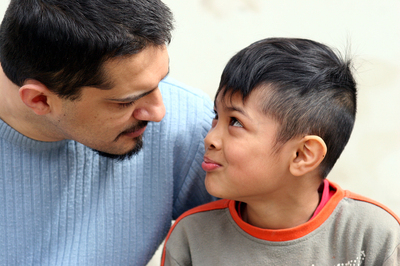
Talking to your child about addiction is hard, but honesty is the best policy, experts agree.
Whether you are currently struggling with addiction or you have been in addiction recovery for a while, the time may come when you feel like a conversation with your kids is appropriate. Read on for a closer look at how to explain past or present addiction to a child.
Children and Exposure to Addiction
Millions of children growing up in America are exposed to addiction. In fact, more than 12 percent of kids aged 17 or under reside with at least one parent who has a substance use disorder, according to the Substance Abuse and Mental Health Services Administration (SAMHSA).
Living in a home where there is substance abuse can be difficult for children, with the potential to impact them in direct and indirect ways, such as parental abuse or neglect and fewer financial resources. Furthermore, these children are also more likely to have increased difficulties familially, academically, and socially.
Even if you and your child no longer live together or if you’ve stopped using, your children are still vulnerable. Says the American Academy of Experts in Traumatic Stress: “The child may no longer be living with the substance-abusing parent because of separation, divorce, abandonment, incarceration, or death. And the parent does not have to be still actively drinking or using for the child to continue to feel the impact of their addiction.”
Honesty Is the Best Policy
If you’re an addict or recovering addict, you’re not alone in wondering if it’s best to address or ignore the issue with your children. According to experts, honesty is the best policy and information is an invaluable tool for helping kids feel safer in their home environments. In the short term, this can prevent them from acting out and withdrawing. It may even prevent them from becoming addicts themselves.
LEAF Council on Alcoholism and Addiction and NCADD board member Julie Dostal, Ph.D., told Motherly: “It is my greatest hope that one day we will talk freely about the disease of addiction as just that: a disease. We talk openly about diabetes, high blood pressure, depression, and multiple other chronic diseases; we should be so bold about the disease of addiction. It is not a moral failing or a character flaw to be whispered about; it is a disease that can be treated and a disease that people recover successfully from.”

Addressing addiction with your children can be an important step on the road to recovery while promoting their sense of safety as well.
This doesn’t mean that the time is now. According to Dostal, the most appropriate time to brooch the subject with children is when it begins to have an impact on the family. The age of the child should also inform the conversation. Recovering addict Jen Simon told The Washington Post: “I think parents should tell their children about their addiction in an age-appropriate way. My sons are still young … they’re only just 3 and 7, so we haven’t gotten to that talk yet. But it’s important for them to know about my history because addiction has a genetic component.”
Age informs not only when you share, but what you share. Simon goes on to point out that you’re not lying if you omit some of the details. Rather, it’s about conveying the truth in a way that they can understand. It can be something as simple as, “Mommy/Daddy is sick, and because of this, he/she does things that none of us can understand,” says Simon. This conversation may evolve as kids grow older.
Opening the lines of communication about addiction is also an opportune time to check in with kids to see how they feel about the situation, keeping it within the context of addiction as an illness. Other things to reinforce? That they’re not alone and that the addiction has nothing to do with them. The National Association for Children of Alcoholics offers the ‘Seven Cs of Addiction” to guide your explanation and their understanding:
I didn’t Cause it. I can’t Cure it. I can’t Control it. I can Care for myself by Communicating my feelings, making healthy Choices and by Celebrating myself.”
Finally, timing is also important. Having the conversation after a blowout is not advised; additionally, some experts believe you should wait until you’re on the road to recovery to initiate the conversation.
Being honest with children about substance abuse is important for several other reasons, as well. For starters, it can help do away with stereotypes about addiction, which often become obstacles to recovery. Furthermore, the most effective substance abuse treatment approaches are holistic; as such, all members of the family may be involved in the recovery process.
If you or someone you love is living with substance misuse and addiction, the wellbeing of any children involved may be in jeopardy. Call us to learn about admissions to leading St. Louis area drug rehab center Harris House.







